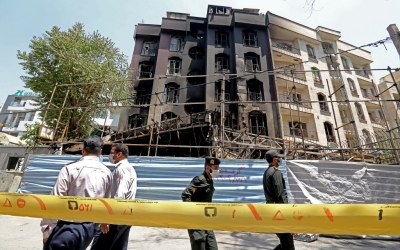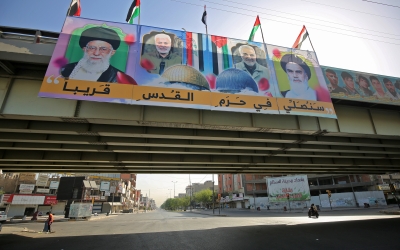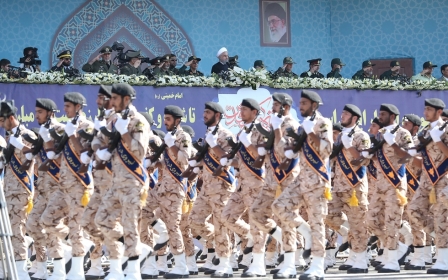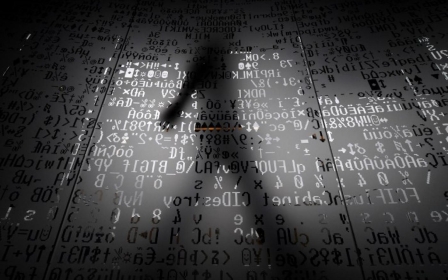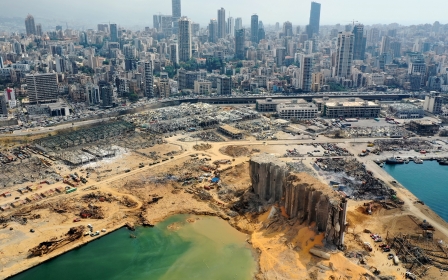British lawyer among five convicted in Iran of spying for Israel, UK and Germany
Iranian authorities have arrested five Iranians on charges of spying for Israel, Britain and Germany, the judiciary said on Tuesday.
"In recent months, five Iranians who were spying for foreign intelligence services have been arrested," judiciary spokesman Gholamhossein Esmaili said in a virtual news conference.
Two of the detainees had been sentenced to 10 years each in jail, he stated.
One of the men, Massud Mossaheb, had been "spying" for the Israeli intelligence agency Mossad and Germany "in the guise" of the general secretary of the Austrian-Iranian Society. He was found to have been providing them with information on Iran’s missile, nuclear, nanotechnology and medical fields, Esmaili said.
The second man, Shahram Shirkhani, had been working for British intelligence, the spokesman said. He claimed the British Iranian sought to "corrupt authorities" and recruit people and give away information on "contracts related to the central bank, Melli Bank and the defence ministry".
According to The Times, Shirkhani was a founding partner at an international law firm in Tehran and, at the time of his arrest, teaching in the faculty of law at Islamic Azad University. He is also a former business associate of corporate lawyer David Mills, husband of the late British MP Tessa Jowell.
Esmaili did not give details on the other three detainees or elaborate on their charges, but indicated that they were working in state bodies.
"We had the arrests in the foreign, defence and energy ministries as well as in the Atomic Energy Organisation," he said.
The announcement of the arrests came after Iran suffered a string of explosions and fires on its infrastructure over the past few months.
The incidents included a blast at the underground Natanz nuclear facility and a blaze at a military and weapons development facility.
According to Reuters, MP Javad Karimi Ghoddusi was quoted by Iranian media as saying that the explosion in Natanz was caused by a "security breach".
The Noor news website, affiliated to the elite Revolutionary Guard, later blamed an Iranian contractor for the explosion.
In an article in early July, state news agency IRNA addressed what it called the possibility of sabotage by enemies such as Israel and the United States, although it stopped short of accusing either directly.
Austria's objection
In mid-2019, Austria had called for the release of Mossaheb on the grounds that no formal charges had been pressed and that the reason for his detention was unknown, AFP reported.
After his detention in January 2019, Mossaheb's family had no contact with him for weeks before eventually learning that the then-72-year-old was being held in Tehran's Evin prison.
According to Austria's Der Standard newspaper, Mossaheb had travelled to Iran to accompany a delegation from an Austrian research centre that had opened a subsidiary near Tehran.
The Austrian-Iranian Society says its aim is to foster closer ties between the two countries, particularly in the economic sphere.
Crackdown on 'spies'
Iran has recently announced several detentions and in some cases executions of people found guilty of spying by its courts.
In July, Iran executed Mahmoud Mousavi Majd, a former translator, for spying for the US and Israel, including tracking the movements of top Iranian military commander Qassem Soleimani who was killed on 3 January in a US air strike in Iraq.
Earlier in the same month, Reza Asgari, who was convicted of spying on Iran's missile programme for the US Central Intelligence Agency (CIA), was also executed.
In February, Tehran handed down a similar sentence for Amir Rahimpour, another man convicted of spying for the US and conspiring to sell information on Iran's nuclear programme.
Tehran announced in December it arrested eight people "linked to the CIA" involved in nationwide street protests that erupted the month before over a surprise petrol price hike.
It also said in July 2019 that it had dismantled a CIA spy ring, arresting 17 suspects between March 2018 and March 2019 and sentencing some of them to death.
US President Donald Trump at the time dismissed the claim as "totally false".
Middle East Eye propose une couverture et une analyse indépendantes et incomparables du Moyen-Orient, de l’Afrique du Nord et d’autres régions du monde. Pour en savoir plus sur la reprise de ce contenu et les frais qui s’appliquent, veuillez remplir ce formulaire [en anglais]. Pour en savoir plus sur MEE, cliquez ici [en anglais].


